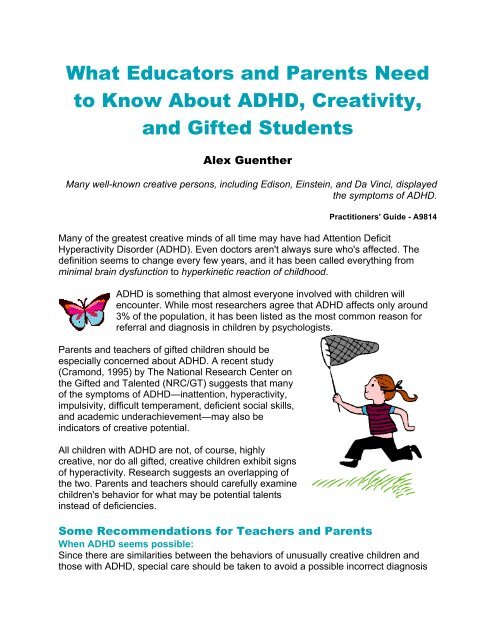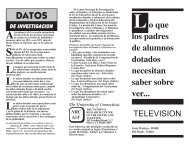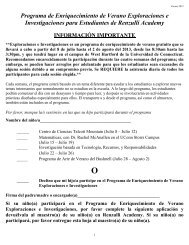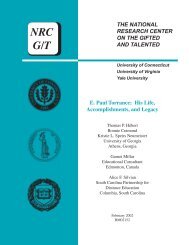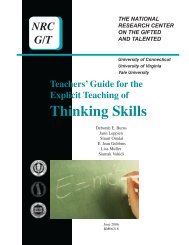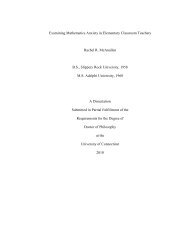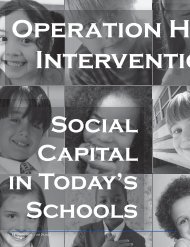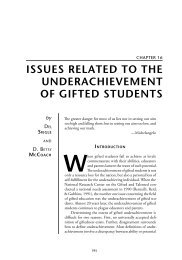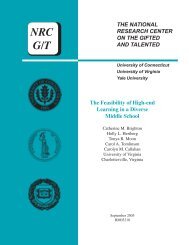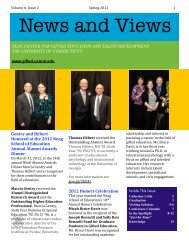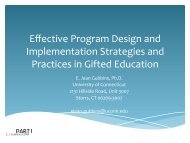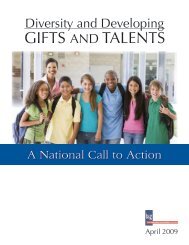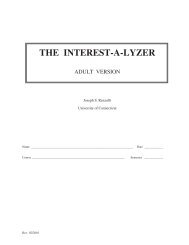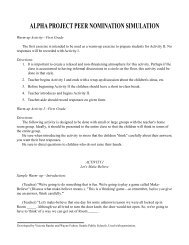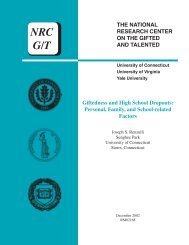What Educators and Parents Need to Know About ADHD, Creativity ...
What Educators and Parents Need to Know About ADHD, Creativity ...
What Educators and Parents Need to Know About ADHD, Creativity ...
Create successful ePaper yourself
Turn your PDF publications into a flip-book with our unique Google optimized e-Paper software.
<strong>What</strong> <strong>Educa<strong>to</strong>rs</strong> <strong>and</strong> <strong>Parents</strong> <strong>Need</strong><strong>to</strong> <strong>Know</strong> <strong>About</strong> <strong>ADHD</strong>, <strong>Creativity</strong>,<strong>and</strong> Gifted StudentsAlex GuentherMany well-known creative persons, including Edison, Einstein, <strong>and</strong> Da Vinci, displayedthe symp<strong>to</strong>ms of <strong>ADHD</strong>.Practitioners' Guide - A9814Many of the greatest creative minds of all time may have had Attention DeficitHyperactivity Disorder (<strong>ADHD</strong>). Even doc<strong>to</strong>rs aren't always sure who's affected. Thedefinition seems <strong>to</strong> change every few years, <strong>and</strong> it has been called everything fromminimal brain dysfunction <strong>to</strong> hyperkinetic reaction of childhood.<strong>ADHD</strong> is something that almost everyone involved with children willencounter. While most researchers agree that <strong>ADHD</strong> affects only around3% of the population, it has been listed as the most common reason forreferral <strong>and</strong> diagnosis in children by psychologists.<strong>Parents</strong> <strong>and</strong> teachers of gifted children should beespecially concerned about <strong>ADHD</strong>. A recent study(Cramond, 1995) by The National Research Center onthe Gifted <strong>and</strong> Talented (NRC/GT) suggests that manyof the symp<strong>to</strong>ms of <strong>ADHD</strong>—inattention, hyperactivity,impulsivity, difficult temperament, deficient social skills,<strong>and</strong> academic underachievement—may also beindica<strong>to</strong>rs of creative potential.All children with <strong>ADHD</strong> are not, of course, highlycreative, nor do all gifted, creative children exhibit signsof hyperactivity. Research suggests an overlapping ofthe two. <strong>Parents</strong> <strong>and</strong> teachers should carefully examinechildren's behavior for what may be potential talentsinstead of deficiencies.Some Recommendations for Teachers <strong>and</strong> <strong>Parents</strong>When <strong>ADHD</strong> seems possible:Since there are similarities between the behaviors of unusually creative children <strong>and</strong>those with <strong>ADHD</strong>, special care should be taken <strong>to</strong> avoid a possible incorrect diagnosis
of <strong>ADHD</strong>. <strong>Parents</strong> <strong>and</strong> teachers should learn as much as possible about the diagnosticcriteria for both creativity <strong>and</strong> hyperactivity. All of the primary symp<strong>to</strong>ms of <strong>ADHD</strong>(inattention, hyperactivity, <strong>and</strong> impulsivity) <strong>and</strong> even some secondary ones (difficulttemperament, deficient social skills, academic underachievement) can be linked <strong>to</strong>creativity. We must realize that these difficult behaviors may indicate special abilities aswell as problems. Traits that cause difficulty for children in school situations might behelpful in adult life, when high energy, risk-taking, flexibility of ideas, <strong>and</strong> ambition maybe assets.When a child seems <strong>to</strong> be hyperactive, parents <strong>and</strong> teachers should observe <strong>and</strong> recordwhich conditions intensify or reduce the key diagnostic signs. <strong>ADHD</strong>-type behaviorsmay become worse when the child is given unstimulating, highly structured, repetitivetasks. Therefore, it may help <strong>to</strong> note when <strong>and</strong> where the child exhibits these behaviors.Also, ask a disruptive or daydreaming child what he or she is thinking about right afterthe occurrence. An inattentive or daydreaming child might be bored by an unchallengingenvironment <strong>and</strong> could be thinking about alternative (<strong>and</strong> creative) stimuli, plans, orideas.If the child is referred for psychological screening:<strong>Parents</strong> should try <strong>to</strong> choose a psychologist who either knows about giftedness <strong>and</strong>creativity as well as <strong>ADHD</strong> or who is willing <strong>to</strong> learn. Unfortunately, few psychologistshave had training in recognizing characteristics of gifted <strong>and</strong> creative children.Therefore, a psychologist who is willing <strong>to</strong> learn about the similarities betweencharacteristics would be preferred. Once a child's behaviors have been interpreted asnegative, it is unlikely that he or she will be seen as gifted. Be sure that a creativity tes<strong>to</strong>r checklist is completed in addition <strong>to</strong> the <strong>ADHD</strong> checklist. In a recent study, 50% of agroup of <strong>ADHD</strong>-diagnosed students scored highly on a creativity test, yet only 21% hadbeen nominated for a gifted program.If the child is diagnosed as having <strong>ADHD</strong>:Do not rule out the possibility of a misdiagnosis. Whether a child isdiagnosed with <strong>ADHD</strong> or not may depend on when <strong>and</strong> where the referralis made. Children diagnosed under one definition of <strong>ADHD</strong> might not bediagnosed under another. Seek a second opinion.Recommendations for the use of medication should be considered very carefully. Thereis reason <strong>to</strong> be concerned that the increase in attention provided by drugs prescribed for<strong>ADHD</strong> comes at a price <strong>to</strong> cognitive functioning in other areas. Also, while medicationgives temporary management of symp<strong>to</strong>ms, there is little evidence of long-termbenefits.Above all, parents <strong>and</strong> teachers should make a special effort <strong>to</strong> provide opportunitiesboth within <strong>and</strong> outside of school <strong>to</strong> enhance creativity <strong>and</strong> build self-esteem. <strong>ADHD</strong>can be a negative label that might affect not only the way the child is perceived byteachers, but also the child's self-perception. While most children diagnosed with <strong>ADHD</strong>obviously require special attention, some may just be energetic <strong>and</strong> unusually creative
kids looking for opportunities <strong>to</strong> express themselves—<strong>and</strong> we can't afford <strong>to</strong> lose theirtalents. It is important for parents <strong>and</strong> teachers <strong>to</strong> bolster these children's self-esteem<strong>and</strong> nurture their strengths as much as possible, in <strong>and</strong> out of school.Genius or Disorder?• Young Thomas Edison "asked questions when [the teacher] expected him only <strong>to</strong>listen, <strong>and</strong> was not listening when she asked questions," <strong>and</strong> "had no patience withhis classmates. . . . Teachers thought him a problem child <strong>and</strong> amischief maker."Conot, R. (1979). A streak of luck. New York: Seaview Books.• The poet Robert Frost "was dropped from school for what we calldaydreaming; during some of his lapses from attention he wasprobably revolving a poem in his mind. Other eminent creativewriters, scientists, <strong>and</strong> inven<strong>to</strong>rs have had similar experiences."Torrance, E. P. (1963). Education <strong>and</strong> the creative potential. Minneapolis, MN: The University ofMinnesota Press.• Leonardo da Vinci rarely finished any of his projects. Although known for hispainting, there are only 17 paintings, some incomplete, attributed <strong>to</strong> him. Hedefended this "attention deficit" by explaining that his interests were <strong>to</strong>o many <strong>and</strong><strong>to</strong>o diverse.Wallace, R. (1966). The world of Leonardo, 1452-1519. New York: Time-Life Books.ReferencesCramond, B. (1995). The coincidence of attention deficit hyperactivity disorder <strong>and</strong> creativity (RBDM9508). S<strong>to</strong>rrs, CT: The National Research Center on the Gifted <strong>and</strong> Talented, University ofConnecticut.<strong>What</strong> is the NRC/GT?The National Research Center on the Gifted <strong>and</strong> Talented (NRC/GT) is funded underthe Jacob K. Javits Gifted <strong>and</strong> Talented Students Education Act, Institute of EducationalSciences, United States Department of Education. The mission of the NRC/GT is <strong>to</strong>plan <strong>and</strong> conduct theory-driven quality research that is problem-based, practicerelevant,<strong>and</strong> consumer-oriented.Further information is available on-line from…The National Research Center on the Gifted <strong>and</strong> Talented (NRC/GT)[http://www.gifted.uconn.edu/nrcgt]Research-Based ResourcesOn-line ResourcesNewslettersResearch TeamResource LinksUnderachievement Study
And NRC/GT's <strong>What</strong> Works in Gifted Education Study…[http://www.gifted.uconn.edu/NRCGT/what_works.html]St<strong>and</strong>ards Used for Math & Reading UnitsSample Math & Reading UnitsThe National Research Center on the Gifted <strong>and</strong> Talented2131 Hillside Road, Unit 3007S<strong>to</strong>rrs, CT 06269-3007Tel: (860) 486-4826 Fax: (860) 486-2900Web: http://www.gifted.uconn.edu/nrcgt


